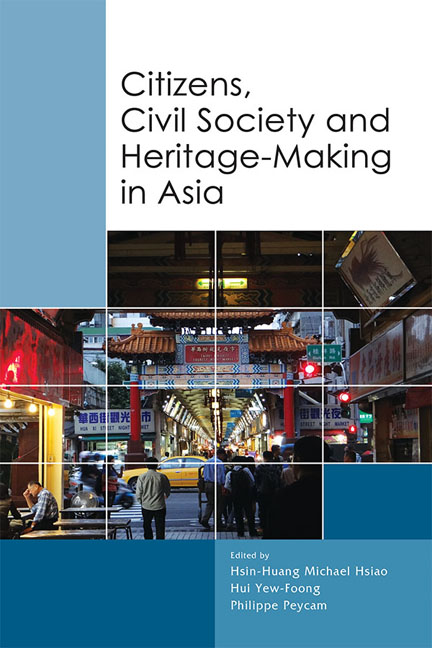Book contents
- Frontmatter
- Contents
- Contributors
- 1 Introduction: Finding the Grain of Heritage Politics
- 2 Heritage, Identity and Power
- 3 Heritage-Making and Post-coloniality in Yangon, Myanmar
- 4 Living Heritage of Ruins? Contesting the Paradox in Trowulan's Majapahit Heritage
- 5 The Reconstruction of Heritage in Rural Vietnam: An Analysis of State and Local Dynamics
- 6 Performing Cultures, Negotiating Identities: The Cultural Politics of Indigenous Cultural Villages in West Malaysia
- 7 Constituting Philippine Filmic and Linguistic Heritage: The Case of Filipino Regional Films
- 8 Encounter and Counter-Narratives of Heritage in Macau
- 9 Cultural Activities of the Chinese Community in Post-war Myanmar
- 10 Chinese Street Opera in Singapore: Heritage or a Vanishing Trade
- 11 Policy Formation and Civil Society Engagement in Heritage-Making in Taiwan: A Historical Examination
- 12 Becoming Taiwanese: Appropriation of Japanese Colonial Sites and Structures in Cultural Heritage-Making — A Case Study on the Wushantou Reservoir and Hatta Yoichi
- 13 Defining Culture in the Heritage Preservation of Taiwanese Veterans’ Villages: The Case of Zuoying
- 14 Tobacco Crop Memories in Taiwan: The Heritage of a Deadly Agriculture
- Index
6 - Performing Cultures, Negotiating Identities: The Cultural Politics of Indigenous Cultural Villages in West Malaysia
Published online by Cambridge University Press: 03 January 2018
- Frontmatter
- Contents
- Contributors
- 1 Introduction: Finding the Grain of Heritage Politics
- 2 Heritage, Identity and Power
- 3 Heritage-Making and Post-coloniality in Yangon, Myanmar
- 4 Living Heritage of Ruins? Contesting the Paradox in Trowulan's Majapahit Heritage
- 5 The Reconstruction of Heritage in Rural Vietnam: An Analysis of State and Local Dynamics
- 6 Performing Cultures, Negotiating Identities: The Cultural Politics of Indigenous Cultural Villages in West Malaysia
- 7 Constituting Philippine Filmic and Linguistic Heritage: The Case of Filipino Regional Films
- 8 Encounter and Counter-Narratives of Heritage in Macau
- 9 Cultural Activities of the Chinese Community in Post-war Myanmar
- 10 Chinese Street Opera in Singapore: Heritage or a Vanishing Trade
- 11 Policy Formation and Civil Society Engagement in Heritage-Making in Taiwan: A Historical Examination
- 12 Becoming Taiwanese: Appropriation of Japanese Colonial Sites and Structures in Cultural Heritage-Making — A Case Study on the Wushantou Reservoir and Hatta Yoichi
- 13 Defining Culture in the Heritage Preservation of Taiwanese Veterans’ Villages: The Case of Zuoying
- 14 Tobacco Crop Memories in Taiwan: The Heritage of a Deadly Agriculture
- Index
Summary
Influenced by transnational indigenous rights movements and heritage activism, indigenous peoples in Malaysia are actively engaging in the display and performance of their tangible and intangible cultural heritage. This has manifested in demonstrations of traditional crafts, customs and rituals, as well as the recent establishment of indigenous cultural villages, a form of living museum or open-air museum which aims to preserve the “living” traditions and customs of cultural peoples by exhibiting collections of buildings and expressions of cultural heritage in an openair setting. In this chapter, I explore how indigenous cultural heritage is being instrumentalized by different actors for different agendas, and the cultural politics of this instrumentalization, through a comparative study of two indigenous cultural villages in West Malaysia; namely, the Mah Meri Cultural Village on Carey Island and the Orang Seletar Cultural Centre in Johor Bahru.
A comparative perspective was adopted as I was drawn to the contrast between the two indigenous cultural villages, despite the fact that they were both established to showcase the cultural heritage of the indigenous peoples of West Malaysia. At the Mah Meri Cultural Village, which was established by the government and features a large tourism complex with modern facilities, the Mah Meri villagers felt disenfranchised by the development. In contrast, the Orang Seletar Cultural Centre, which features a small wooden hut constructed by the Orang Seletar villagers from modest funding provided by an international organization, the development played a significant role in the assertion of local indigenous rights.
The comparison of these two indigenous cultural villages offers insights into the workings of a state-initiated “top-down” heritage project represented by the Mah Meri Cultural Village, and those of a communityinitiated “bottom-up” heritage project represented by the Orang Seletar Cultural Centre. This chapter attempts to shed light on the implications of UNESCO's recent mandate for the instrumentalization of culture for development and the gradual decentralization of aid provision through intermediary agencies and entrepreneurs in the current age of neoliberalism. While UNESCO has a laudable mandate to integrate culture and heritage as part of human development strategies aimed at community development, the instrumentalization of culture for development seems to produce uneven outcomes.
- Type
- Chapter
- Information
- Citizens, Civil Society and Heritage-Making in Asia , pp. 114 - 136Publisher: ISEAS–Yusof Ishak InstitutePrint publication year: 2017



